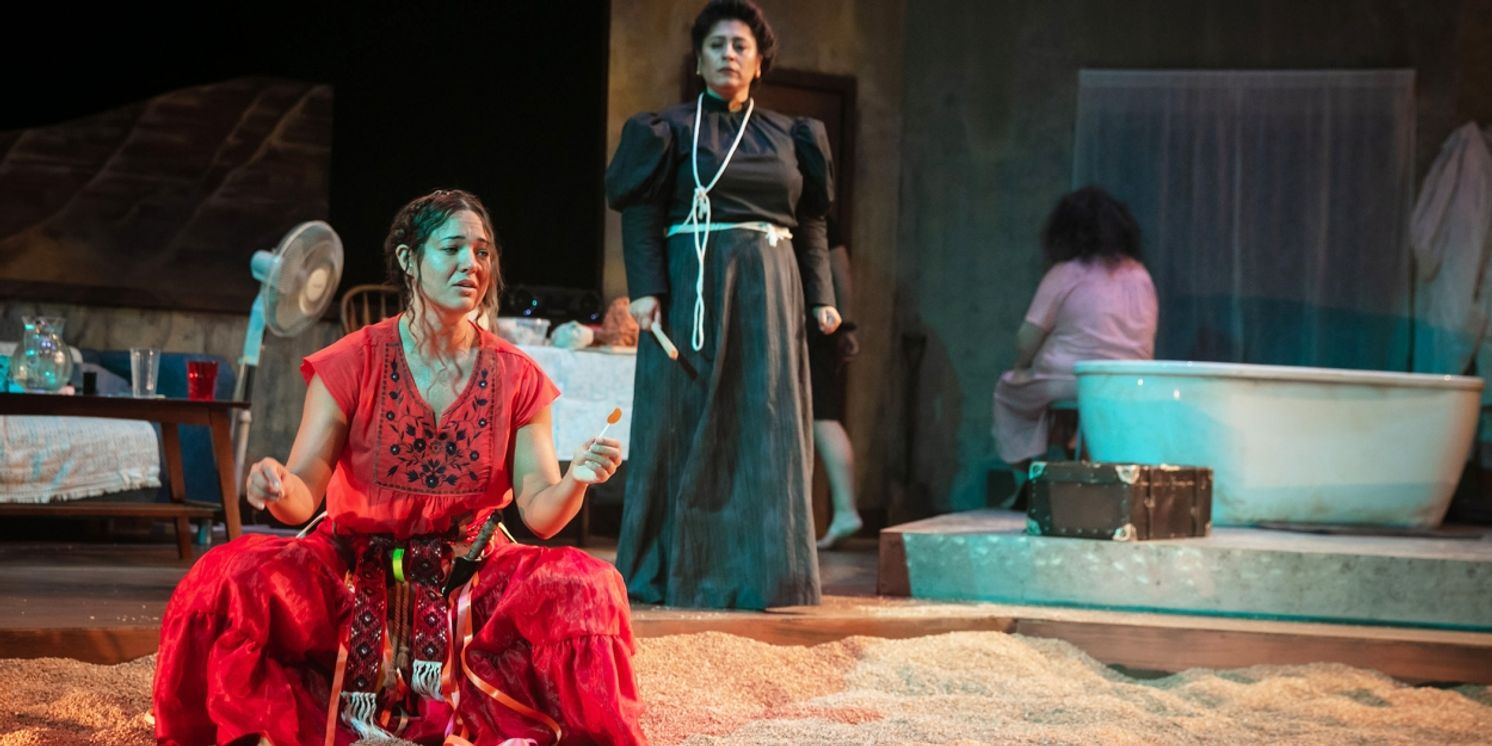Review: DESERT STORIES FOR LOST GIRLS at Latino Theatre Company In Association With Native Voices At The Autry
Playing September 30 through October 16, 2022

There is an essential account that needs to be told in DESERT STORIES FOR LOST GIRLS. That's clear. What's not quite working in this Native Voices/Latino Theater Company co-production and world premiere, however, is the narrative framework, staging, and direction. But the importance of this largely untold and untaught chronicle is nevertheless undiminished.
DESERT STORIES FOR LOST GIRLS is impressively ambitious. Based on playwright Lily Rushing's true Genízaro history, it is a deeply spiritual, 100% experientially female narrative that explores identity, family, colonialism, and generational violence endured specifically by Native American women.
Genízaro (heˈnēsǝrō) is a New Mexican term that appeared as early as 1610, given initially to detribalized indigenous Native Americans brought as servants to the Spanish.
Beginning in the early 1600s, Spanish colonists sought to "reeducate" the Native people of the North American Southwest. Funded by the Spanish Crown, the Spanish first abducted and then later purchased war captives from surrounding tribes, including Apache, Comanche, Kiowa, Navajo, Pawnee, and Ute. The colonists took these individuals to their households, where they were taught Spanish and converted to Catholicism. They were forced to work as household servants, tend fields, herd livestock, and serve as frontier militia to protect Spanish settlements. Many endured physical abuse. While settling western lands in search of gold and expansion, Spaniards not only raped its resources but also its women, leaving behind a devastating trail of systemic generational trauma which is the heart and soul of DESERT STORIES FOR LOST GIRLS.
When 18-year-old Carrie moves in with her seemingly dementia-suffering grandmother Rosa, she is slowly drawn into a world of memory and mystery that unearths her family's Genízaro identity beginning with her ancestor, Placida. Placida, now an unsettled spirit, has been searching for her son who had been adopted and raised by the man who raped her at 11 years old and his barren wife. As she wanders through each lifetime of her female Jacinto descendants, she watches and protects them from the violent spirit of her oppressor and his wife and speaks to them about their history. She is now with Carrie and Rosa. The Spaniard who hurt her follows and continues to inflict violence upon the women - essentially keeping the unhealed wound of the Jacinto women open.
DESERT STORIES FOR LOST GIRLS begins and ends with Placida's plight. Her experience speaks to women everywhere who have to survive brutality brought on by war, appropriation, and oppression. For Placida, generation after generation, the injustice remains fresh as her descendants suffer until Carrie comes along, finally makes sense of it all, and essentially "breaks the wheel".
There are some interesting performances in DESERT STORIES FOR LOST GIRLS the most stunning being Samantha Bowling as Placida. Bowling is potent with unabashed, earthy sensuality and hard-core determination to stand up for truth. It is hands down the best performance of the show followed by Rainbow Dickerson as Rosita Jacinto/Black. Dickerson is truly the emotional center - the unwavering heart and the conscience of the piece. Brenda Banda also gives a strong performance as Josefa Jacinto. All the performances are beautifully and dramatically enhanced by the gorgeous costume design of Lorna Bowen and lighting/projection design by Derek Christiansen and Ruby O'Brien.
Above all, in DESERT STORIES FOR LOST GIRLS healing happens. In this full-circle journey, for these women, for us, and for their future generations, there is the sense that this is what life for all Native American women absolutely needs to be about.
Written by Lily Rushing.
Directed by Sylvia Cervantes Blush
September 30 through October 16 at The Los Angeles Theatre Center.
Low-priced previews begin September 28.
The cast of Desert Stories for Lost Girls includes Katie Anvil Rich (Cherokee, Chickasaw) as Carrie; Carolyn Dunn (Cherokee, Mvskoke Creek, French Creole and Tunica/Choctaw Biloxi descent) as Rosa; Samantha Bowling (Cherokee) as Placida; Rainbow Dickerson (Rappahannock, Thai, European descent) as Rosita, Rosa's younger self; Glenn Stanton (Cherokee), doubling as Rosita's husband, Joe, and Spanish landowner Nicholas Jacinto; Brenda Banda as Josefa Jacinto; and Tom Allard (Loyal Shawnee) as Carrie's Uncle Edgar.
The creative team includes scenic and props designer Christopher Scott Murillo; lighting and projection design team Derek Christiansen and Ruby O'Brien; sound designer Mia Glenn-Schuster; costume designer Lorna Bowen (Muscogee Creek, Seminole, Cherokee); and dramaturg Courtney Elkin Mohler (Santa Barbara Chumash). Desert Stories for Lost Girls is produced by Latino Theater Company in association with Native Voices at the Autry.
Desert Stories for Lost Girls was developed at DePaul University and in the Indigenous Circles collaboration between Native Voices and PlayPenn.
Desert Stories for Lost Girls opens on Friday, Sept. 30 at 8 p.m., with performances thereafter taking place on Thursdays, Fridays and Saturdays at 8 p.m. and Sundays at 4 p.m. through October 16. Two preview performances take place on Wednesday, Sept. 28 and Thursday, Sept. 29, each at 8 p.m. Tickets range from $10-$48, except opening night which is $58 and includes a reception, and previews, which are Pay-What-You-Choose starting at $5.
The Los Angeles Theatre Center is located at 514 S. Spring St., Los Angeles, CA 90013. Parking is available for $5 with box office validation at Joe's Parking structure, 530 S. Spring St. (immediately south of the theater).
To purchase tickets and for more information, including up-to-date Covid-19 safety protocols on the day of each performance, call (213) 489-0994 or go to www.latinotheaterco.org.
Content warning: This play explores many aspects of injustice against Indigenous peoples that are emotionally distressing. Indigenous women in our time are disproportionately more likely to experience sexual assault and violence than any other demographic group. This play reckons with the historical reality of sexual violence as a tool of colonization and holds space for the psychological impacts of such abuse through generations.
Samantha Bowling, Brenda Banda, Carolyn Dunn
Photo by Grettel Cortes Photography
Reader Reviews
Videos

